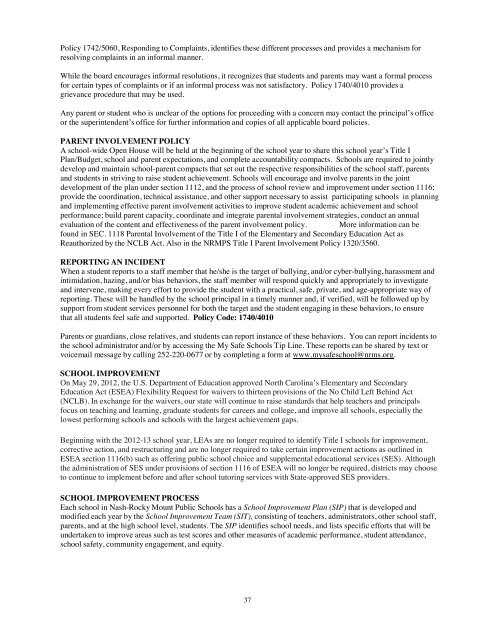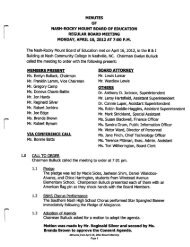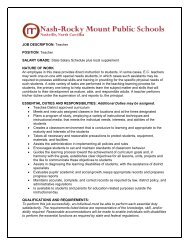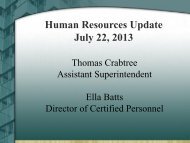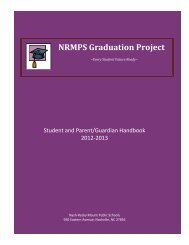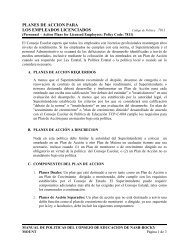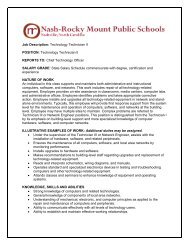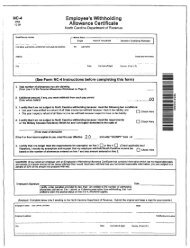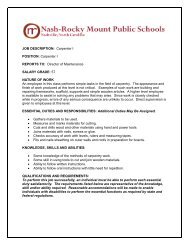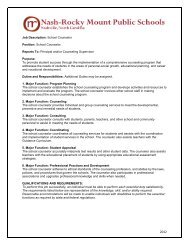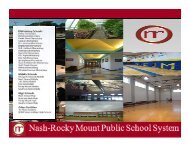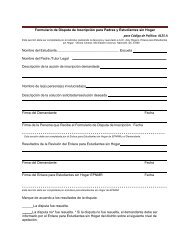2013-14 Student/Parent Handbook - Nash-Rocky Mount Schools
2013-14 Student/Parent Handbook - Nash-Rocky Mount Schools
2013-14 Student/Parent Handbook - Nash-Rocky Mount Schools
Create successful ePaper yourself
Turn your PDF publications into a flip-book with our unique Google optimized e-Paper software.
Policy 1742/5060, Responding to Complaints, identifies these different processes and provides a mechanism for<br />
resolving complaints in an informal manner.<br />
While the board encourages informal resolutions, it recognizes that students and parents may want a formal process<br />
for certain types of complaints or if an informal process was not satisfactory. Policy 1740/4010 provides a<br />
grievance procedure that may be used.<br />
Any parent or student who is unclear of the options for proceeding with a concern may contact the principal’s office<br />
or the superintendent’s office for further information and copies of all applicable board policies.<br />
PARENT INVOLVEMENT POLICY<br />
A school-wide Open House will be held at the beginning of the school year to share this school year’s Title I<br />
Plan/Budget, school and parent expectations, and complete accountability compacts. <strong>Schools</strong> are required to jointly<br />
develop and maintain school-parent compacts that set out the respective responsibilities of the school staff, parents<br />
and students in striving to raise student achievement. <strong>Schools</strong> will encourage and involve parents in the joint<br />
development of the plan under section 1112, and the process of school review and improvement under section 1116;<br />
provide the coordination, technical assistance, and other support necessary to assist participating schools in planning<br />
and implementing effective parent involvement activities to improve student academic achievement and school<br />
performance; build parent capacity, coordinate and integrate parental involvement strategies, conduct an annual<br />
evaluation of the content and effectiveness of the parent involvement policy. More information can be<br />
found in SEC. 1118 <strong>Parent</strong>al Involvement of the Title I of the Elementary and Secondary Education Act as<br />
Reauthorized by the NCLB Act. Also in the NRMPS Title I <strong>Parent</strong> Involvement Policy 1320/3560.<br />
REPORTING AN INCIDENT<br />
When a student reports to a staff member that he/she is the target of bullying, and/or cyber-bullying, harassment and<br />
intimidation, hazing, and/or bias behaviors, the staff member will respond quickly and appropriately to investigate<br />
and intervene, making every effort to provide the student with a practical, safe, private, and age-appropriate way of<br />
reporting. These will be handled by the school principal in a timely manner and, if verified, will be followed up by<br />
support from student services personnel for both the target and the student engaging in these behaviors, to ensure<br />
that all students feel safe and supported. Policy Code: 1740/4010<br />
<strong>Parent</strong>s or guardians, close relatives, and students can report instance of these behaviors. You can report incidents to<br />
the school administrator and/or by accessing the My Safe <strong>Schools</strong> Tip Line. These reports can be shared by text or<br />
voicemail message by calling 252-220-0677 or by completing a form at www.mysafeschool@nrms.org.<br />
SCHOOL IMPROVEMENT<br />
On May 29, 2012, the U.S. Department of Education approved North Carolina’s Elementary and Secondary<br />
Education Act (ESEA) Flexibility Request for waivers to thirteen provisions of the No Child Left Behind Act<br />
(NCLB). In exchange for the waivers, our state will continue to raise standards that help teachers and principals<br />
focus on teaching and learning, graduate students for careers and college, and improve all schools, especially the<br />
lowest performing schools and schools with the largest achievement gaps.<br />
Beginning with the 2012-13 school year, LEAs are no longer required to identify Title I schools for improvement,<br />
corrective action, and restructuring and are no longer required to take certain improvement actions as outlined in<br />
ESEA section 1116(b) such as offering public school choice and supplemental educational services (SES). Although<br />
the administration of SES under provisions of section 1116 of ESEA will no longer be required, districts may choose<br />
to continue to implement before and after school tutoring services with State-approved SES providers.<br />
SCHOOL IMPROVEMENT PROCESS<br />
Each school in <strong>Nash</strong>-<strong>Rocky</strong> <strong>Mount</strong> Public <strong>Schools</strong> has a School Improvement Plan (SIP) that is developed and<br />
modified each year by the School Improvement Team (SIT), consisting of teachers, administrators, other school staff,<br />
parents, and at the high school level, students. The SIP identifies school needs, and lists specific efforts that will be<br />
undertaken to improve areas such as test scores and other measures of academic performance, student attendance,<br />
school safety, community engagement, and equity.<br />
37


